- Home
- Michelle Tea
Mermaid in Chelsea Creek Page 18
Mermaid in Chelsea Creek Read online
Page 18
Sophie was going to say banana cream pie when the perfect banana cream pie appeared aside the cookies.
“I am like Boginki!” Hennie laughed. “I wait so long to spoil you, my niece, now I stuff you with magic pastry!”
“It’s okay,” Sophie said. “I didn’t eat breakfast.”
Hennie wrinkled her face at that, and then blinked at the cookies. “Very nutritious, now,” she said. “Eat all you want.”
* * *
“FIRST OF ALL,” Hennie said, “your grandfather not dead. Kishka turn grandfather to dog. She say he killed in dump, by hoodlums. He never die. Kishka turn him to dog, he live with me, in my house, down the street.”
Sophie’s mouth hung open. She tightened her grip on her magical cocoa, because this was the sort of moment people let glasses slip from their hands in movies. Sci-fi movies. Fantasy movies. Of course that house, that spooky, solitary witch’s house, was Hennie’s. And she had seen the dog, the German Shepherd on the porch, looking up and down the abandoned block, its tongue dangling from its mouth in the dust. That dog was her grandfather? “No,” she said.
“Yes.”
“No!”
“Yes, Sophie. Carl is dog. Is terrible magic. He not know he is Carl anymore, he think he is only dog. He behave like dog, he is dog.” Hennie heaved a big sigh and shook her head. “Kishka let him be picked up by, what you call—pound? They have him in cage, would adopt maybe, maybe he become police dog, maybe put to sleep, no one know. I adopt him.” Hennie sighed. “I more cat woman. Not much like dog. But what to do? Let Carl become drug dog in Chelsea? Too bad for such a man. He would not want.”
“What about your magic?” Sophie asked. She felt a desperate anxiety rise at the simple notion that a person can get cursed into a dog. “Can’t you free him? Can’t you do anything?”
“No,” Hennie said, simply. “Is brilliant zagavory. She use terrible magics, things I cannot touch. Some things, you cannot touch and remain good. Kishka, she touch anything she want. She use all kind of bad magic to make Carl dog.”
Sophie took stock of what she had learned thus far: she was only part human, another part was—what was the word—Odmieńce. Hennie the creepy old witch lady was her aunt. Her grandfather was Hennie’s dog. What were the Polish words Hennie was flinging around, a jumbled rubble of language, all these zs? “What are the words?” Sophie asked. “All the Polish words?” Words were practical, unemotional, simple. She could carry a word like a piece of sea glass on her chest, solid and helpful.
“Yes, new words for you. Znakharka. That is witch. You are znakharka.”
“Znakharka.”
“Zagavory. That is spell. Magic spell.”
“Got it.”
“Zawolanie. That is like, special noise only for you. A magical noise, you make it, is yours. You sound your zawolanie when you make your zagavory, and it will be full of your power. Is like you call out to all the universe and all who know you hear, and answer.”
“Can’t you just say, like, magic noise and magic spell?” Sophie asked. “Do you have to use those big Polish words?”
Hennie looked hurt. “Suit self.” She shrugged. “Noble, ancient Polish words. Your tradition. You lose words, you lose power, lose magic. I work,” she said, “to speak in your language. You come for magic, you speak in mine. In my language that is also yours. Even if you don’t feel it.”
Sophie felt embarrassed. “Okay,” she said. “Will you teach me my—”
“Zawolanie?” she asked. “No. I teach you nothing. You know everything. My work is to tell you the stories of who you are.”
“Thank you, Hennie.” Sophie began to rise. “I guess, do I call you Auntie Hennie?”
Hennie smiled, but did not look happy. “Sit back,” she said. “We are not done. I will slow time, Kishka be damned. You do not yet know your story.”
* * *
THERE WAS A special hush in Hennie’s shop. It felt a bit like being passed out—things felt enchanted, a sort of slow tingle, like she was on the inside of a slow globe, an aquarium, a crystal ball. The very air around her seemed warped. Hennie had taken great handfuls of salt and tossed them into the room’s four corners, speaking in Polish. She’d taken a stick with a beautiful rock tied to its tip, long and sharp like a dagger, she’d cut a wide circle in the air with it, still murmuring in her native tongue. Then she spoke her zawolanie. It was a surprise to hear such a beautiful call come out of the old woman. Everything about her felt gruff and rough to Sophie, her heavy voice with its chunky English, the warts, the babushka pushing her gray hair flat, her wide face, the bulk of her. But Hennie’s zawolanie was a chime. It enchanted Sophie and it enchanted time itself. The hush that followed was like a first snowfall, untouched and glistening. She thought about how Hennie was a winter witch.
“You did it,” Sophie said, half-expecting to be able to see the steam of her breath in the air before her face.
“You feel it?”
“Yes,” she breathed. “And your zawolanie is so beautiful.”
“The zawolanie,” Hennie said, “is you, only a sound. It is the sound of your essence. It is like the key of your magic, unlocking everything.”
“How do I get mine?” Sophie asked.
“You go to the mall,” Hennie said. “Is zawolanie store. Come in many colors, you buy one you like.” It took Sophie a minute to realize her aunt was making a joke.
“Hennie,” she said, “You can’t. You can’t make jokes. Because you could be like, oh, a talking pigeon will tell you, or a mermaid will bring you one, ha ha ha, and, I’m, like, scrambling over here, because a couple days ago there were no mermaids or talking pigeons, so for all I know some gremlins opened a store in the mall that looks like a computer store but, whoa, it’s a magical zawolanie store! Come on in, we’ll customize you the best zawolanie ever, give you a great deal!” Sophie could feel a certain hysteria rising behind her own joke, the pull of tears straining in her face. Hennie could feel it, too.
“Is true,” Hennie agreed. “Too much weird stuff to make joke. Your zawolanie is inside you. When you make zagavory, you will feel your zawolanie come.”
“Okay. How do I make zagavory?”
“It depend what you want. Many zagavory. You want to be invisible, you want to make person do what you want, you want to make someone love you. Some of these bad magic. Very tricky. Must be clear in heart.”
“Is it bad magic to make someone love you?” she asked.
“Mostly yes. Unless big reason to have the person love, bigger than you just wanting love. Understand?”
“No. So, if I just have a crush on someone I can’t make them love me back?”
“No, no. The Dola come for you, they very angry. Dola like—police. But they police of destiny. You make a person go against their destiny, Dola very upset. They haunt you. And you go against your own destiny, Dola haunt you also.”
“How do I know if I’m going against my destiny?”
“You just know,” Hennie insisted. “You feel.”
“But, like, if I go against my destiny, isn’t it my destiny to go against my destiny?” Sophie’s head was spinning. It looked like Hennie’s was, too. She put her palm to her broad forehead.
“Child,” she said, “You are speaking like Boginki, like crazy this and that. You have destiny, I have destiny, even little Boginki have destiny. You go against your destiny, Dola come, they bother you forever. So, know your own self and do what you know you must do, and stop no one from doing what they must do, understand?”
“Yes,” Sophie said, even though she didn’t, exactly. “What do they look like, the Dola?”
“They look like a bad feeling,” Hennie said. “Hope you never see. Now, more, fast. I don’t like keeping time for long. It makes humans weary. They feel thick in their head from it. Now—here.” Hennie handed Sophie a pouch on a string. It had a cool design on it.
“What is it?”
“Is your magic pouch.”
“Is the
re a Polish z-word for it?” Sophie asked.
“Just say magic pouch.” Hennie was getting tired. It took a lot of magic will to stop time. “Inside, for you, much salt, good stone, good herbs. Pigeon bones.”
“Ew, why pigeon bones?”
“Pigeon your animal. Everyone have animal, you are pigeon.”
“Wait—are you talking about power animals?” Sophie knew about power animals, everyone did. Ella liked to say she was a parrot, or a dolphin. Sophie thought she might be a cat, she liked cats a lot. She hadn’t even considered a person’s power animal could be a pigeon. She realized she hadn’t been thinking of pigeons as either powerful, or animals. They were pests. Sophie felt sad, thought of her friends on the wire outside Hennie’s shop, waiting for her. She wondered if they could feel the stopped time. If she left Hennie’s house, what would the world look like?
“Okay, pigeons are my power animal.”
“Good animal to have. They fly. Their bones are light, hollow, so they can lift themselves. You are light boned, you can move fast when you must. Pigeon have special magic, no one know they are magic, no one ever think such beast have magic. You are like that, too.”
“I am?”
“Yah. You dirty, snarly-haired girl, full of magic.” Hennie laughed. “You wise like pigeons, stick with people, and help people like the pigeons. You have noble history, like pigeon. They are really rock doves, quite lovely, and you are really Odmieńce. Half Odmieńce. Brings me to next, final story, quite bad—”
“Wait, what do I do with this?” Sophie shook her magic pouch, hearing things rattling softly inside the cloth.
“Just keep it. Wear it, put it in purse.”
“I don’t have a purse, that’s my mom’s.”
“You teenage girl, should have purse and brush hair, yah?”
“I guess.”
“Is your life, what do I know?” Hennie shrugged. “Anyway, just keep on you.” Hennie paused. “Really, think about a purse. You will be accumulating much magical object.”
“But what does it do?” Sophie asked.
“You want to make zagavory, everything you need in pouch. Is perfect zagavory kit! I make myself. Very thorough.” Hennie looked proud. “You need more, you come here. Or, you think of it, say your zawolanie, poof, you will have. But, come see me, please. I like you very much.”
“Oh, Hennie.” Sophie was not accustomed to feeling this affection from an older person, a relation. Family. She was embarrassed at how badly she wanted it. She pushed herself into her aunt, hugging her tight. Her wide, soft body smelled like cookies and tea and herbs and flowers.
“Wait, Sophie,” she said. “I have more bad to tell. Your father. Your father is man you know. Name is Ronald. You have met him, yah?”
Sophie shook her head. Ronald. Pathetic Ronald, drooling, drunk Ronald, gross filthy stinking Ronald was her father? She wasn’t ready for this information. Unlike the wild revelations of talking pigeons of creek-dwelling mermaids, there was no magic in it—just sadness and disgust. She suddenly felt overwhelmed and pulled away. “Hennie, I heard enough. I have to go; I’ve been here too long.”
“Time is stopped,” Hennie said.
“I just can’t hear anymore. I can’t take it!” She could hear her voice, too loud in the cozy room.
“You must, Sophie. You have to know everything. And there is more—”
“No!” Sophie dashed to the counter, where her mother’s purse sat. She stuffed her magic pouch inside it, and then the orange juice, the soup box, the lemon and the honey.
“Sophie, you keep Syrena waiting. The mermaid. She waits for you, but you must know everything before you go with her—”
“Go with her? I’m not going anywhere with her! I’m thirteen years old, I live here, in Chelsea!”
“You are Odmieńce.”
“That means nothing to me.” Sophie had hit overload, and Hennie had more? Sophie had a witch for a grandmother, a dog for a grandfather, a drunk for a dad. What more could there be? “I gotta go,” Sophie said. “I’ll come back some other time and you can tell me everything.”
“Sophie, there is an order. It is time. You must stay.” Hennie’s open palm held something grainy, heavy. She flung it into the fire, and again Sophie heard the gorgeous call of Hennie’s zawolanie. It almost made her stay. The sound of it fluted through her, calming her. Why was she in such a hurry? Time was stopped. She looked at Hennie, sweet Hennie, her stricken face. She only wanted to show Sophie who she was.
“Argh!” Sophie hollered, her voice echoing off the wood and stone of the small shop. Hennie had charmed her! She could feel the zagavory stunning her mind, enacting its will upon her, making Sophie doubt herself. She should stay—no, she was being enchanted—no, she should stay, it wasn’t a bad enchantment—that’s not the point!— Sophie’s will flailed inside her. She didn’t want to stay! How dare Hennie! “How dare you!” she thundered at the old woman. And Sophie felt something rising inside her like a thing alive. It was her, had always been within her, and it flexed itself suddenly, like a muscle that ran the length of her body. From the soles of her feet to the top of her head, Sophie tingled and burned as the sound surged upward, escaping her mouth in a noise so pure, so sharp and fierce it exploded the glass in Hennie’s shop, filling the room with liquids and herbs. The glass of candles shattered, releasing blobs of molten wax. And Hennie. Poor Hennie, her hands plastered to her ears to keep the sound out, Hennie was hit by a wave of sound dense as brick, flung backward onto a shelf of books. All of them—znakharka, paper, wood—tumbled together to the floor. Hennie’s eyes remained closed. Sophie looked with horror at all she had done, all she had not intended to do. With her mother’s purse on her shoulder, she tore out of Hennie’s Grocery.
Chapter 17
Sophie slammed out of the grocery store, Chelsea’s humidity hitting her like a wall of water. She stood on the dusty corner, the crossroads. If she kept walking forward down Heard Street she would arrive at her house, where her mother slept, where Dr. Chen and her grandmother were possibly headed. Behind her, the homes and pavement fell away and there was dust, abandoned buildings, her grandfather in the form of a German Shepherd. The cross street was Maple. What if Sophie just took off? If she walked Maple in one direction it would take her beneath the looming green overpass that delivered cars to Boston. She would hit train tracks, vacant lots, an abandoned playground. She would come upon the shopping mall, almost all the stores inside closed, the ones still open strange boutiques, dollar stores selling shelves of toxic toilet cleaners next to rows of ceramic swans. Sophie was never allowed to go down Maple, because dead women had been found there. On the tracks, under the overpass, in a dumpster behind an industrial building. Sophie grew up hearing stories of the dead women; in her mind, they were solid landmarks, as present as the Tobin bridge, and as normal—surely most cities had bridges and playgrounds, shopping malls and dead women. Standing in front of Hennie’s, the air eerily still, she realized that it maybe wasn’t so. Maybe having so many dead women was particular to Chelsea.
In the other direction Maple was lined with the same shabby houses common to Chelsea. In the summertime they didn’t look too bad; most all of them had wide, leafy trees in their yards, or outside on the sidewalk, the muscled roots busting up the pavement. But if you looked beyond the canopy of green you would see how worn the homes were, the siding cracked, the stairs a hazard. Graffiti sprayed over doors and windows. Overgrown front lawns hid treasures of garbage. In the winter, with everything green receded and dead, the depressing face of Chelsea was undeniable. Maybe that was why Sophie liked summer best. That and no school, no mean nuns, no wearing the same ugly jumper every day, jumpers that began to smell a little by Wednesday, that absolutely held an odor by Friday, that hopefully would get washed over the weekend. At least that part of her life was over, Sophie realized. No more Catholic school. Hello, Chelsea High. The thought made her laugh out loud, breaking the strange quiet. She was supposed to go to high
school after this?
The pigeons were stirring above her. Sophie realized they weren’t frozen by the stoppage of time; they were, like Sophie, somehow immune to it. There had to be another reason for their stillness. Could Sophie read a pigeon? She scanned them, huddled in a line on the wire, the way birds gather before a storm. Which pigeon would have the least disturbing interior? She selected Livia, and pushed her way inside the bird.
What it felt like to be so small! That struck Sophie first. She realized she perceived her own emotions as running the length of her body, and to feel such a fullness of feelings compacted inside the tiny body of a bird was new. Like a tightly wrapped bouquet as opposed to a sprawling garden of flowers. And Livia’s feelings were sweet, it was sweet to be Livia, her heart was so pure, so oriented toward rightness that she could relax and follow it, and she did, and there was little conflict inside her bird heart. There were many pulses of love, and Sophie could feel how the bird loved the sky, how she loved Arthur, delighted in his cranky rants, found them noble and adorable at once. Sophie felt a pulse of love for the wind, which Livia interacted with as a living thing with a will of its own, one that Livia had learned to understand and love. And there, a pulse of love for Sophie. Sophie felt joy at this, and shame. She didn’t know that she deserved it. Swarming the love was a sadness, a worry, a concern. A disappointment? Sophie didn’t want to feel that. She couldn’t feel sweet, pure-hearted Livia’s disappointment in her. She pulled herself out of the pigeon.
“I didn’t mean it!” she shouted up at the birds on their wire, and they shuffled and cooed, spoke in bird language, like they weren’t magical at all, or like Sophie was no longer special enough to hear their crystalline voices.
“Don’t talk about me in your bird languages when I’m standing right here!” Sophie hollered. “It’s rude! I can tell you’re talking about me!” She zoomed deeper into Livia and felt the bird’s concern rise above her disappointment. “If you’re so worried about me don’t talk about me behind my back when I’m right in front of you!” Sophie was crying now. She didn’t like the birds’ silence, she didn’t like the world when time was stopped. It felt wrong, the air heavy and still, nothing moving. Walking felt like pushing through soup. When would Hennie put everything back to normal?

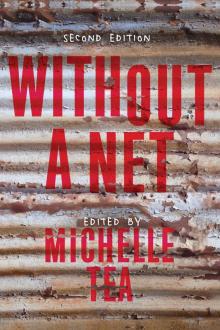 Without a Net
Without a Net Black Wave
Black Wave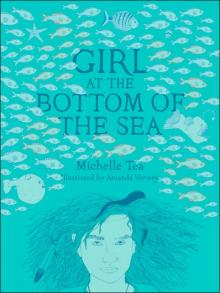 Girl at the Bottom of the Sea
Girl at the Bottom of the Sea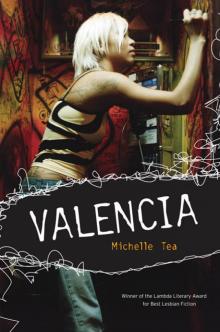 Valencia
Valencia How to Grow Up
How to Grow Up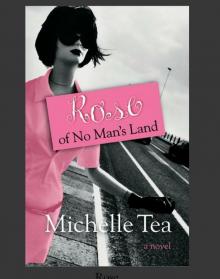 Rose of No Man's Land
Rose of No Man's Land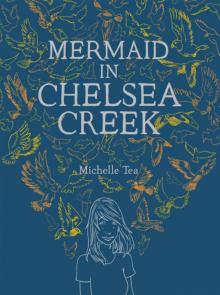 Mermaid in Chelsea Creek
Mermaid in Chelsea Creek